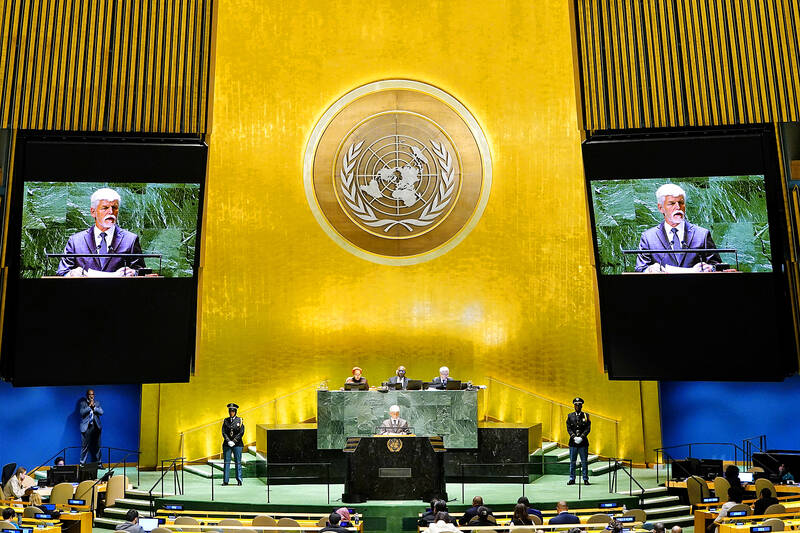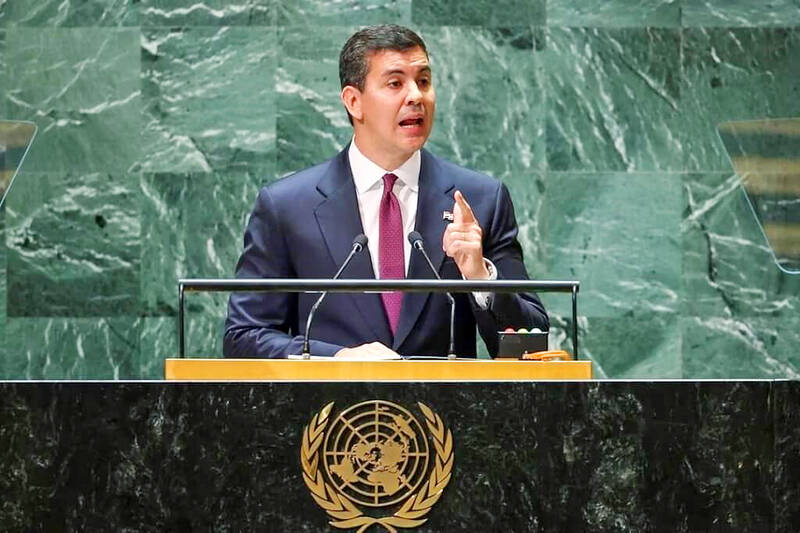The leaders of three diplomatic allies — Guatemala, Paraguay and Palau — on Tuesday voiced support for Taiwan’s inclusion in the UN on the first day of the UN General Debate in New York.
In his address during the 78th UN General Assembly, Palauan President Surangel Whipps Jr urged the UN and all parties involved in cross-strait issues to exercise restraint and seek a peaceful resolution.
“The well-being and prosperity of nations and their economies are intrinsically linked to global peace and stability,” he said.

Photo: AP
He also thanked partner nations such as Taiwan, Australia, Japan and the US for providing assistance and training opportunities to help Palauans upskill.
“We also advocate for change regarding the Republic of China, Taiwan, being unjustly excluded from UN systems, despite its remarkable leadership and innovative solutions,” he said, adding that the global organization should allow Taiwan to participate in crucially important agencies, because it has much to offer.
Citing the UN Charter, which affirms the equal rights of all people and nations, Whipps called on the UN to uphold that vision by allowing Taiwan to participate and contribute.

Photo: Reuters
Outgoing Guatemalan President Alejandro Eduardo Giammattei made a similar plea during his address.
He said that the UN should recognize the importance of “inclusivity and universality.”
“How can it be that in the 21st century, this organization has excluded a country like Taiwan? A country that contributes to science, technology, health and development; but yet we exclude its citizens from having a voice in this forum,” he said.
He urged the UN “to exhaust all measures that are necessary to guarantee international peace and security in the Taiwan Strait.”
Paraguayan President Santiago Pena, who assumed the presidency last month, expressed his government’s support of Taiwan as “an integral part of the United Nations system.”
Also on Tuesday, Czech President Petr Pavel, who is making his first appearance at the UN General Assembly since assuming office in March, criticized the People’s Republic of China (PRC) for its military maneuvers in the Taiwan Strait.
“We deplore China’s military actions which have raised tensions in the Taiwan Strait, as well as its unfriendly action against partners in the South China Sea. Any disputes or contentious issues must be solved peacefully. Any potential armed conflict in the region would have negative consequences on the whole world,” Pavel said.
It marks the second consecutive year a government representative from the Czech Republic has raised such concerns at the UN General Assembly.
Last year, a plea for cross-strait peace was made by Czech Minister of Foreign Affairs Jan Lipavsky.
The leaders of two more diplomatic allies, Eswatini and the Marshall Islands, were scheduled to make their addresses at the General Debate yesterday.
Taipei previously said that it had asked its 13 diplomatic allies, as well as like-minded nations, to voice support for its inclusion in the UN system, either by speaking up during the General Assembly or sending a letter to UN Secretary-General Antonio Guterres.
Several side events have also been launched by the Taipei Economic and Cultural Office in New York and a delegation of Taiwanese lawmakers visited the city to advocate for Taiwan’s inclusion in the UN.
Taiwan left the UN in 1971 and it has since been excluded from its special agencies.

SECURITY: As China is ‘reshaping’ Hong Kong’s population, Taiwan must raise the eligibility threshold for applications from Hong Kongers, Chiu Chui-cheng said When Hong Kong and Macau citizens apply for residency in Taiwan, it would be under a new category that includes a “national security observation period,” Mainland Affairs Council (MAC) Minister Chiu Chui-cheng (邱垂正) said yesterday. President William Lai (賴清德) on March 13 announced 17 strategies to counter China’s aggression toward Taiwan, including incorporating national security considerations into the review process for residency applications from Hong Kong and Macau citizens. The situation in Hong Kong is constantly changing, Chiu said to media yesterday on the sidelines of the Taipei Technology Run hosted by the Taipei Neihu Technology Park Development Association. With

CARROT AND STICK: While unrelenting in its military threats, China attracted nearly 40,000 Taiwanese to over 400 business events last year Nearly 40,000 Taiwanese last year joined industry events in China, such as conferences and trade fairs, supported by the Chinese government, a study showed yesterday, as Beijing ramps up a charm offensive toward Taipei alongside military pressure. China has long taken a carrot-and-stick approach to Taiwan, threatening it with the prospect of military action while reaching out to those it believes are amenable to Beijing’s point of view. Taiwanese security officials are wary of what they see as Beijing’s influence campaigns to sway public opinion after Taipei and Beijing gradually resumed travel links halted by the COVID-19 pandemic, but the scale of

A US Marine Corps regiment equipped with Naval Strike Missiles (NSM) is set to participate in the upcoming Balikatan 25 exercise in the Luzon Strait, marking the system’s first-ever deployment in the Philippines. US and Philippine officials have separately confirmed that the Navy Marine Expeditionary Ship Interdiction System (NMESIS) — the mobile launch platform for the Naval Strike Missile — would take part in the joint exercise. The missiles are being deployed to “a strategic first island chain chokepoint” in the waters between Taiwan proper and the Philippines, US-based Naval News reported. “The Luzon Strait and Bashi Channel represent a critical access

Pope Francis is be laid to rest on Saturday after lying in state for three days in St Peter’s Basilica, where the faithful are expected to flock to pay their respects to history’s first Latin American pontiff. The cardinals met yesterday in the Vatican’s synod hall to chart the next steps before a conclave begins to choose Francis’ successor, as condolences poured in from around the world. According to current norms, the conclave must begin between May 5 and 10. The cardinals set the funeral for Saturday at 10am in St Peter’s Square, to be celebrated by the dean of the College